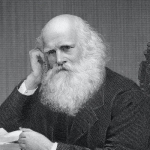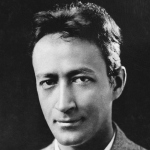1
I can support it no longer.
Laughing ruefully at myself
For all I claim to have suffered
I get up. Damned nightmarer!
It is New Hampshire out here,
It is nearly the dawn.
The song of the whippoorwill stops
And the dimension of depth seizes everything.
2
The whistles of a peabody bird go overhead
Like a needle pushed five times through the air,
They enter the leaves, and come out little changed.
The air is so still
That as they go off through the trees
The love songs of birds do not get any fainter.
3
The last memory I have
Is of a flower that cannot be touched,
Through the bloom of which, all day,
Fly crazed, missing bees.
4
As I climb sweat gets up my nostrils,
For an instant I think I am at the sea,
One summer off Cap Ferrat we watched a black seagull
Straining for the dawn, we stood in the surf,
Grasshoppers splash up where I step,
The mountain laurel crashes at my thighs.
5
There is something joyous in the elegies
Of birds. They seem
Caught up in a formal delight,
Though the mourning dove whistles of despair.
But at last in the thousand elegies
The dead rise in our hearts,
On the brink of our happiness we stop
Like someone on a drunk starting to weep.
6
I kneel at a pool,
I look through my face
At the bacteria I think
I see crawling through the moss.
My face sees me,
The water stirs, the face,
Looking preoccupied,
Gets knocked from its bones.
7
I weighed eleven pounds
At birth, having stayed on
Two extra weeks in the womb.
Tempted by room and fresh air
I came out big as a policeman
Blue-faced, with narrow red eyes.
It was eight days before the doctor
Would scare my mother with me.
Turning and craning in the vines
I can make out through the leaves
The old, shimmering nothingness, the sky.
8
Green, scaly moosewoods ascend,
Tenants of the shaken paradise,
At every wind last night’s rain
Comes splattering from the leaves,
It drops in flurries and lies there,
The footsteps of some running start.
9
From a rock
A waterfall,
A single trickle like a strand of wire,
Breaks into beads halfway down.
I know
The birds fly off
But the hug of the earth wraps
With moss their graves and the giant boulders.
10
In the forest I discover a flower.
The invisible life of the thing
Goes up in flames that are invisible,
Like cellophane burning in the sunlight.
It burns up. Its drift is to be nothing.
In its covertness it has a way
Of uttering itself in place of itself,
Its blossoms claim to float in the Empyrean,
A wrathful presence on the blur of the ground.
The appeal to heaven breaks off.
The petals begin to fall, in self-forgiveness.
It is a flower. On this mountainside it is dying.














Comment form: